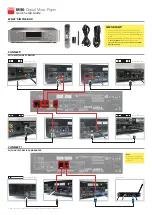
Chapter 4. Browsing and playing
27
database uses to sort the songs can be completely customised. More information on how
to achieve this can be found on the Rockbox website at
4.2.2. Initializing the Database
The first time you use the database, Rockbox will scan your disk for audio files. This can
take quite a while depending on the number of files on your player. This scan happens
in the background, so you can choose to return to the Main Menu and continue to listen
to music. If you shut down your player, the scan will continue next time you turn it on.
After the scan is finished you may be prompted to restart your player before you can
use the database.
Ignoring Directories During Database Initialization
You may have directories on your player whose contents should not be added to the
database. Placing a file named
database.ignore
in a directory will exclude the files in
that directory and all its subdirectories from scanning their tags and adding them to the
database. This will speed up the database initialization.
If a subdirectory of an ‘ignored’ directory should still be scanned, place a file named
database.unignore
in it.
The files in that directory and its subdirectories will be
scanned and added to the database.
4.2.3. The Database Menu
Load To RAM
The database can either be kept on flash storage (to save memory), or
loaded into RAM (for fast browsing). Setting this to
Yes
loads the database to
RAM, allowing faster browsing and searching. Setting this option to
No
keeps the
database on the flash storage, meaning slower browsing but it does not use extra
RAM and saves some battery on boot up.
Auto Update
If
Auto update
is set to
on
, each time the player boots, the database
will automatically be updated.
Initialize Now
You can force Rockbox to rescan your disk for tagged files by using the
Initialize Now
function in the
Database Menu
.
Warning:
Initialize Now
removes all database files (removing runtimedb data
!
also) and rebuilds the database from scratch.
Update Now
Update now
causes the database to detect new and deleted files
Note:
Unlike the
Auto Update
function,
Update Now
will update the database
b
regardless of whether the
Directory Cache
is enabled. Thus, an update using
Update now
may take a long time.
Unlike
Initialize Now
, the
Update Now
function does not remove runtime
database information.
The Rockbox manual
(version 3.14)
Sansa Clip v2
















































